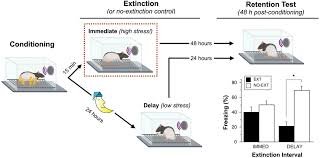Why in the News?
Scientists at the University of Texas and UCLA identified specific neurons in the paraventricular thalamus (PVT) that trigger stress-enhanced fear responses (SEFR). The finding may revolutionize treatment for PTSD, phobias, and anxiety, enabling more targeted and ethical therapies.
Ethical Issues Involved
| Ethical Issue | Explanation and Ethical Reflection |
| 1. Ethics of Animal Experimentation | – The study used mice models and induced stress using mild electric shocks. – Raises concerns about animal welfare, proportionality, and necessity in experimentation. – As per Bentham’s utilitarian ethics, the moral value lies in minimizing suffering and maximizing welfare — experiments must yield significant human benefit to justify animal pain. – Ethical guidelines like the 3Rs (Replace, Reduce, Refine) must be strictly followed. |
| 2. Human Application and Neuroethics | – Translating these findings to human treatment involves manipulating neural circuits. – Raises concerns about autonomy, consent, and identity — altering brain chemistry could alter personality or memory. – Kantian ethics stresses treating individuals as ends in themselves, not means; therapies must respect personhood and dignity. – Neuroethical frameworks should ensure psychological interventions remain restorative, not controlling. |
| 3. Psychological Suffering and Duty of Care | – PTSD and fear disorders cause deep suffering; society has a moral obligation to treat them compassionately. – Aristotle’s virtue ethics reminds us of the virtue of compassion and prudence in healthcare. – Ethical healthcare demands balancing scientific innovation with empathy and holistic care. – Civil servants and healthcare workers must display emotional intelligence in public health policy related to mental well-being. |
| 4. Justice and Accessibility of Treatment | – Advanced therapies developed from such research could be expensive or exclusive. – Rawls’ theory of justice emphasizes fairness — all individuals should have equal opportunity to access mental health treatments. – Ethical governance requires public funding, inclusion in insurance schemes, and awareness programs for equitable access. |
| 5. Responsibility of Scientists and Institutions | – Research on fear and trauma directly impacts mental health policy and human behavior. – Max Weber’s “ethic of responsibility” applies — scientists must anticipate potential misuse of neurotechnologies. – Oversight bodies should ensure results are not misused for coercive psychological control or unethical defense research. – Transparency, peer review, and adherence to institutional ethics boards are essential. |
Course of Action
| Course of Action | Description and Ethical Grounding |
| 1. Strengthening Ethical Oversight in Research | – Mandate ethical review committees for all neuroscience and animal studies. – Ensure proportionality of harm and benefit — experiments only when no humane alternatives exist. – Encourage open data sharing and public accountability, inspired by Mahatma Gandhi’s ideal of truth and transparency. |
| 2. Humane and Compassionate Science | – Train researchers in empathy, compassion, and bioethics alongside technical skills. – Swami Vivekananda’s principle of service to humanity should guide scientific inquiry — science must uplift human well-being, not exploit subjects. – Promote ethical sensitivity in curricula of neuroscience and psychology. |
| 3. Public Health Integration and Awareness | – Governments and civil servants should integrate mental health ethics into public policy and administration. – Adopt proactive counseling, stress management, and trauma recovery programs in schools, workplaces, and law enforcement. – Examples: IPS officer Manoj Kumar Sharma and others have championed empathy-based policing and stress management programs. |
| 4. Equitable and Inclusive Mental Health Policy | – Ensure mental health therapies from such research reach rural and underprivileged communities. – Introduce subsidized treatment schemes and mental health insurance coverage. – Reflects Amartya Sen’s capability approach, ensuring all citizens have real opportunities to achieve psychological well-being. |
| 5. Global Ethical Collaboration | – Encourage cross-country collaboration guided by UNESCO’s Universal Declaration on Bioethics and Human Rights. – Develop shared ethical standards for neuroscience to prevent exploitation. – Encourage civil servants, scientists, and ethicists to jointly develop mental health frameworks promoting dignity, justice, and compassion. |
Conclusion
The study on stress-enhanced fear response bridges neuroscience and ethics, revealing how trauma reshapes the brain — and moral responsibility. While scientific progress offers immense therapeutic promise, it demands a compassionate, just, and transparent approach, ensuring that innovation uplifts human dignity without crossing ethical boundaries.
| EnsureIAS Mains Question Q. Scientific advances in neuroscience, such as studies on stress-enhanced fear responses, offer hope for treating trauma and anxiety but also raise deep ethical dilemmas. Discuss these ethical challenges in light of moral theories and suggest how science can progress responsibly while upholding human dignity. (150 Words) |
Also Read | |
| UPSC Foundation Course | UPSC Daily Current Affairs |
| UPSC Monthly Magazine | CSAT Foundation Course |
| Free MCQs for UPSC Prelims | UPSC Test Series |
| Best IAS Coaching in Delhi | Our Booklist |




